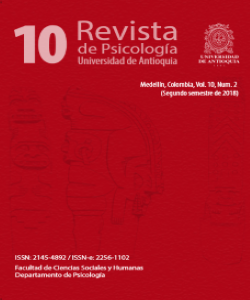Gregor Samsa, the split subject
DOI:
https://doi.org/10.17533/udea.rp.v10n2a09Keywords:
Transformation, Body, Real, Imaginary, Symbolic.Abstract
In this article I will use the literary text “The Transformation” by Franz Kafka, to analyze Gregor Samsa as a narrative figure from the imaginary, symbolic and real registers. The motive is to make evident the Gregor’s subject division, being this character (as a being) one of the many possible objects of psychoanalysis in the literature. Therefore, I will appeal to Hegel to understand the knowledge and the constitution of the selfconsciousness, to Freud to understand the similarity between literary creation and the dream, and to Lacan who assumes the unconsciousness as a language and, likewise, the subject like the effect of the interpellation of the language.
Downloads
References
BioDic (2019). Diccionario de Biología. Recuperado de https://www.biodic.net/palabra/metamorfosis/#.XOHW-iD0nIU
Bits, L., Lerner, O., Pogrebinsky, I. (productores) y Fokin, V. (director) (2002). Prevrashchenie (Metamorphosis) [Película]. Rusia: Vsevolod Meyerhold’s Creative Center.
Borges, J. (3 de julio de 1983). Un sueño eterno. El País. Recuperado de https://elpais.com/cultura/2015/04/09/actualidad/1428570964_294931.html
Freud, S. (1978) [1915-1916]. «Conferencias de introducción al psicoanálisis (partes I y II)». En Obras completas. Vol. xv (pp. 115-124). Buenos Aires: Amorrortu.
Freud, S. (1979) [1920]. «Más allá del principio de placer». En Obras completas. Vol. XVIII (pp. 1-62). Buenos Aires: Amorrortu.
Freud, S. (1990) [1929]. «Malestar en la cultura». En Obras completas. Vol. XXI (pp. 57-140). Buenos Aires: Amorrortu.
Fuentes, A. (2016). El misterio del cuerpo hablante. Barcelona: Gedisa.
Hegel, G. (1985). Fenomenología del espíritu. México: Fondo de Cultura Económica.
Heidegger, M. (2015). Construir, habitar, pensar. Madrid: Oficina de Arte y Ediciones.
Kafka, F. (1974). La metamorfosis. Madrid: Alianza.
Kafka, F. (2004). Die Erzählungen und andere ausgewählte Prosa. Leck: Claussen & Bosse.
Kafka, F. (2010). La metamorfosis. En F. Kafka, La metamorfosis y otros relatos de animales (pp. 41-97). Barcelona: Austral.
Kafka, F. (2012). La transformación. Bogotá: Géminis.
Lacan, J. (2002). «El estadio del espejo como formador de la función del yo [je] tal como se nos revela en la experiencia psicoanalítica». En Escritos II (pp. 99-106). Buenos Aires: Siglo XXI.
Lacan, J. (2008). «La ciencia y la verdad». En Escritos I (pp. 813-836). Buenos Aires: Siglo XXI.
Miller, J. A. (1988). Matemas II. Buenos Aires: Manantial.
Robert, M. (1980). Acerca de Kafka. Acerca de Freud. Barcelona: Anagrama.
Saussure, F. (1987). Curso de lingüística general. Madrid: Alianza.
Saussure, F. (1985). Curso de lingüística general. Barcelona: Planeta DeAgostini.
Stach, R. (2003). Kafka. Los años de las decisiones. Madrid: Siglo XXI.
Wetter, N. (5 de abril de 2015). Der Buchmschlag der Verwandlung: nur kein Käfer!
Franz Kafka: Die Werwandlung. Recuperado de https://nataschawetter.wordpress.com/2015/04/05/der-buchumschlag-der-verwandlung-nur-kein-kafer/
Downloads
Published
How to Cite
Issue
Section
License
Copyright (c) 2019 Revista de Psicología Universidad de Antioquia

This work is licensed under a Creative Commons Attribution-NonCommercial-ShareAlike 4.0 International License.
Texts submitted for evaluation to the Journal of Psychology of the University of Antioquia must have never been published before, nor been accepted for future publication by any other journal.
Upon the Journal’s acceptance for publication of submitted material, the author partially transfers his/her rights on the article, preserving those relative to its non-commercial use and academic circulation as a free-access file.
Except if otherwise decided, this Journal’s content is covered by a Creative Commons licence “Attribution - Non-commercial – share a like” Colombia 4.0. The licence can be checked out here.












